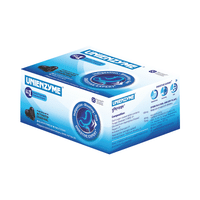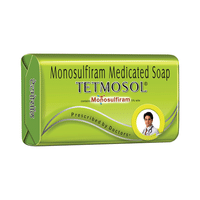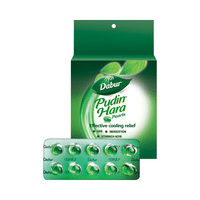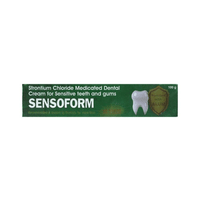D Penem S 1000mg/500mg Injection

Rs.2666for 1 vial(s) (1 Injection each)
food interaction for D Penem S
alcohol interaction for D Penem S
pregnancy interaction for D Penem S
lactation interaction for D Penem S
food
alcohol
pregnancy
lactation
No interaction found/established
Caution is advised when consuming alcohol with D Penem S 1000mg/500mg Injection. Please consult your doctor.
CAUTION
D Penem S 1000mg/500mg Injection is generally considered safe to use during pregnancy. Animal studies have shown low or no adverse effects to the developing baby; however, there are limited human studies.
SAFE IF PRESCRIBED
D Penem S 1000mg/500mg Injection is probably safe to use during breastfeeding. Limited human data suggests that the drug does not represent any significant risk to the baby.
SAFE IF PRESCRIBED
SALT INFORMATION FOR D Penem S
Meropenem(1000mg)
Uses
Meropenem is used in severe bacterial infections. It is used in infections of various body parts like skin and soft tissues, urinary tract, blood, brain and lungs (pneumonia).
How it works
Meropenem is an antibiotic. It kills bacteria by preventing them from forming the bacterial protective covering (cell wall) which is needed for them to survive.
Common side effects
Rash, Headache, Vomiting, Nausea, Itching, Diarrhea, Injection site inflammation, Anemia (low number of red blood cells), Sepsis, Constipation, Apnea (absence of breathing), Shock, Thrombophlebitis, Injection site reactions (pain, swelling, redness), Abdominal pain, Gastrointestinal bleeding, Dark colored stool, Nosebleeds, Intrabdominal bleeding, Chest pain, Heart failure, Fast heart rate, High blood pressure, Hypotension (low blood pressure), Oral fungal infection, Decreased appetite, Cholestatic jaundice, Jaundice, Peripheral edema, Insomnia (difficulty in sleeping), Agitation, Delirium (acute confusional state), Respiratory disorder, Red spots or bumps, Renal failure, Vaginal yeast infection, Urinary incontinence, Inflammation of vein, Hypersensitivity, Cutaneous reactions, Clostridium difficile associated diarrhea, Low blood platelets
Sulbactam(500mg)
Uses
Sulbactam is used in the treatment of severe bacterial infections. It treats severe bacterial infections (most commonly pneumonia, bacteremia and skin and skin structure infections) caused by the pathogen Acinetobacter baumanii.
How it works
Sulbactam is a beta-lactamase inhibitor. It works by blocking an enzyme called beta lactamase produced by bacteria to inactivate antibiotics. Sulbactam is frequently combined with beta-lactam antibiotics, such as ampicillin, cefoperazone, meropenem. As a single medicine, it treats infection caused by a type of bacterium called Acinetobacter baumanii. This activity is mediated by its interaction with certain proteins.
Common side effects
Diarrhea, Injection site pain
SUBSTITUTES FOR D Penem S
159 Substitutes
159 Substitutes
Sorted By
- Merosure SB 1000 mg/500 mg Injection(1 ml Injection in vial)Alkem Laboratories LtdRs. 958/ml of Injection
 Rs. 988save 64% more per ml of Injection
Rs. 988save 64% more per ml of Injection  Rs. 1368save 50% more per Injection
Rs. 1368save 50% more per Injection Rs. 1260save 54% more per Injection
Rs. 1260save 54% more per Injection Rs. 3095pay 13% more per Injection
Rs. 3095pay 13% more per Injection Rs. 988save 64% more per Injection
Rs. 988save 64% more per Injection
Expert advice FOR D Penem S
- Meropenem is an antibiotic that's usually only given in the hospital for serious infections.
- It is given by a drip into a vein (intravenous infusion) over 20 to 60 minutes.
- Inform your doctor if you are allergic to penicillin or if you are taking any seizure medication before starting treatment with this medication.
- Diarrhea may occur as a side effect. Inform your doctor if you develop severe stomach pain or if you find blood in your stools.
- Your doctor may monitor your kidney function and blood count while you are having treatment with this medication.
Frequently asked questions FOR D Penem S
Meropenem
Q. My friend has a history of epilepsy and she was on valproic acid while receiving treatment with Meropenem, still, she had an episode of seizure. Why?
Any previous history with any other medication should be informed to the doctor before starting your treatment with Meropenem. Medicines like Meropenem can interfere with valproic acid which is used for the treatment of epilepsy, making it less effective. So, the reason for the recent episode of seizure could be the result of such drug interaction. Generally, in cases like these, the doctor prescribes a different medicine.
Q. Even though Meropenem is used for skin infections, can it cause any skin-related problems?
Serious skin reactions are rare, but some have been reported with the use of Meropenem. Therefore, before starting the treatment inform your doctor if you are allergic to any medicine or antibiotic. Serious skin reactions are a type of allergic reaction. But, if not properly managed then they can endanger life. So, if you notice any rash along with fever or peeling of the skin, discontinue the medication and inform your doctor.
Q. Is Meropenem a strong antibiotic? Which infections does it treat?
Meropenem is a broad-spectrum antibiotic which means it can treat a variety of bacterial infections. It is used to treat infections affecting the lungs (pneumonia) and complicated infections of the urinary tract, abdomen, and skin and soft tissue infections. Along with that, it is also helpful in treating bacterial infection of the membranes that surround the brain and spinal cord (meningitis) and infections that occur during or after delivery.
Sulbactam
Q. Why is Sulbactam added to other antibiotics?
Sulbactam added to other antibiotics like ampicillin, cefoperazone, etc., because Sulbactam contains Sulbactam, a beta-lactamase inhibitor, which reduces resistance and enhances the activity of other antibiotics like ampicillin, cefoperazone, etc., against the bacteria.
Q. Who should not take Sulbactam?
Sulbactam should not be taken by an individual if he/she had an allergic reaction to ampicillin, sulbactam, or any penicillin antibiotic (such as penicillins or cephalosporins), or if he/she has a history of liver problems caused by ampicillin/sulbactam.
Q. What should I discuss with my doctor before receiving Sulbactam?
Before taking Sulbactam, you should tell your doctor if you have ever had an allergic reaction to Sulbactam or any similar medicine. Inform the doctor if you have any type of allergy, asthma or breathing problems, heart disease or kidney disease. Let your doctor know about all the medicines that you may be taking as they may affect or be affected by Sulbactam. Pregnant or breastfeeding mothers should also seek their doctor’s advice before taking Sulbactam.






















